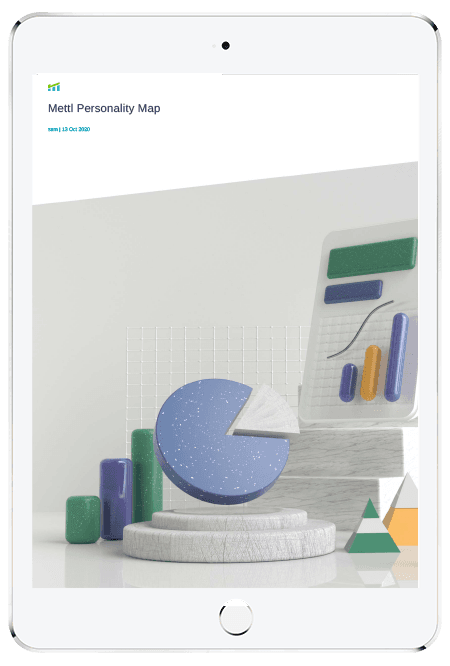Technical And Quantitative Aptitude Test for effective pre-hiring screening
The questions in this Technical Aptitude Test are directed to help gauge candidates' skills, knowledge, and abilities in specific technical areas or domains. The Technical Ability Test evaluates an applicant’s comprehension ability and utilization of technical concepts, demonstrates expertise in particular fields, and applies problem-solving and analytical thinking skills.
Ready to use
Aptitude
0-1 year
Moderate
60 Minutes
36 Questions
Junior software engineer, software engineer, engineering graduates/undergraduates
English Singapore, English India, English Philippines, Indonesian, English UK, English UAE, English Global, English Indonesia
Inside this Technical and Quantitative Aptitude Assessment
An Online Technical Aptitude Test is critical in recruitment processes. It can assess a candidate’s ability to reason with logic, problem-solving capabilities, critical thinking skills, numerical computation and reasoning, attention to detail, inclination to learn and apply information, cognitive skills, and much more. An Online Technical Aptitude Test can be administered to applicants by potential employers before they are considered for a job role.
The comprehensive questions in this Technical Aptitude Test by Mercer | Mettl aim to help organizations gauge applicants' knowledge, problem-solving skills, and analytical thinking skills in particular technical domains related to programming and technology. This Technical Aptitude Test covers many topics, including object-oriented programming (OOP) concepts and data structures' fundamental elements, such as linked lists, queues, arrays, and sorting and searching algorithms.
Furthermore, there is a section within the assessment based on hands-on programming skills, where applicants will be assessed on their coding skills and their understanding of basic coding principles. This section helps organizations gain further insight into a candidate's capability to apply conceptual knowledge to practical coding requirements and their practical programming skills. The test also comprises technical aptitude questions that cover quantitative aptitude. This section covers several topics, including profit and loss, discounts, percentages, averages, ratios and proportions, time and work calculations, simple and compound interest, and interpretation of tables and graphs. These questions help assess the applicant’s problem-solving skills, which are relevant for technical domains and help assess their quantitative reasoning and numerical proficiency.
Overview
Candidates with technical aptitude must excel at specific technical tasks. Recruitment involves assessing the individual’s technical ability, creativity, and personality traits, which enables them to maximize their potential to the fullest. That is why analyzing candidates’ technical aptitude is crucial when hiring for specific technical roles, like those of engineers, technicians, mechanics, etc. The pace at which companies adopt technologies in alignment with tech innovation and their business strategy leads to increased demand for tech professionals. An Online Technical Aptitude Test must act as a meeting point for these high-demand skill clusters.
Implementing the Online Technical Aptitude Test as a screening tool can work exceptionally well in helping recruiters gauge the technical and quantitative skills of the candidates so they can identify applicants that fit a technical job role perfectly. A Technical Ability Test can also help recruiters reduce the time involved in screening and hiring suitable candidates for technical jobs.
The Technical Aptitude Test by Mercer | Mettl provides an excellent way for organizations to screen candidates in technical domains and determine the critical technical skills needed to perform and excel in professional environments. The knowledge and skills a candidate must show in a Technical Aptitude Test are particular and complex. This Technical Ability Test can help organizations evaluate critical competencies for efficient screening. The technical aptitude questions can be used to hire engineering candidates with 0-1 years of experience for entry-level roles.
SKILL LIBRARY
Technical Aptitude Test competency framework
Get a detailed look inside the test
Technical Aptitude competencies under scanner
Technical Aptitude Test
Competencies:
This section includes questions covering basic data structure, object-oriented programming concepts, sorting and searching, arrays, linked lists, and queues.
This section assesses the fundamental coding skills of candidates and their ability to apply knowledge and concepts in practical coding scenarios.
This section includes questions about profit and loss, discounts, percentages, averages, ratios and proportions, time and work calculations, SI and CI, and table and graph interpretation.
Customize this Technical Aptitude Test
Flexible customization options to suit your needs
Choose easy, medium or hard questions from our skill libraries to assess candidates of different experience levels.
Add multiple skills in a single test to create an effective assessment. Assess multiple skills together.
Add, edit or bulk upload your own coding questions, MCQ, whiteboarding questions & more.
Get a tailored assessment created with the help of our subject matter experts to ensure effective screening.
The Mercer | Mettl Technical Aptitude Assessment advantage
Frequently Asked Questions (FAQs)
1. What is a strong technical aptitude?
Strong technical aptitude refers to exceptional technical abilities that allow individuals to perform or excel in specific technical roles without additional training. Individuals with strong technical talent are unique and have technical prowess and creativity, which translates to high technical intelligence, better spatial thinking skills, and intellectual abilities.
2. What does it mean to have technical aptitude?
Having technical aptitude refers to having an intrinsic preference for the technical domain, enabling a person with technical skills to perform better than others in similar roles, thereby increasing the likelihood of success at work.
3. Can we benchmark candidates founded on the internal sample set for the technical aptitude test?
The Mercer | Mettl Technical Aptitude Test is for helping recruiters find the right tech candidates for specific job roles. However, the test can also be tailored to specific requirements, allowing benchmarking for custom sample sets. Please write to Mercer | Mettl with the request.
4. Can one customize the technical aptitude test report to incorporate specific analyses?
Yes. Mercer | Mettl has previously customized the technical aptitude test reports based on the client’s requirements and will do so. Please write to Mercer | Mettl with the request.


